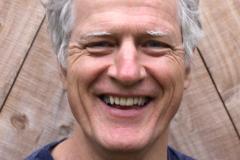Sixth North Carolina Pottery Conference March 5, 6, 7, 1993
Above the commode in Dwight Holland's upstairs bathroom reads a placard, "Ideas won't keep, something must be done about them." Six years ago an idea was floated to try to gather all of North Carolina's potters together to watch some pottery movies, and thanks to the efforts of Dwight and the late Dorothy and Walter Auman, the idea was expanded and the First North Carolina Pottery Conference was organized.
The conference has become a much loved, small scale state potters' conference. Ably sponsored by the Randolph County Arts Guild, the conference began with a program aimed at assessing the relationship between North Carolina's rich folk pottery heritage and its diverse contemporary ceramic scene.
This year's program featured Jack Troy as workshop leader. A seasoned and well polished professional, Jack drew participants toward his clear and passionate evocation of the potter's role in society. Deft paddling of narrow necked vases and loose faceting of tea bowls were particularly dynamic demonstrations. He illustrated this with wonderful slides, punctuated by humorous and enlightening stories.
Well known for his love of wood-firing, Jack offered a view of the aesthetic toward which he aspires: the richness and imperfections of natural surfaces, deep knowledge of his materials and process, the honesty and looseness that can come from years of disciplined craftsmanship, and the great rewards of working in groups. At his best, Jack and other exponents of this style are creating works as distinct, refined, vital and uncompromising as pots from any of the great yakeshime traditions of Japan.
It was apparent from Jack's slides of early Pennsylvania stoneware potteries that the contemporary potters in the audience were much wealthier than their forebears, a fact illustrated further by Ralph Rinzler, Assistant Secretary Emeritus of the Smithsonian Folkways Division. He was in North Carolina selling his collection of Southern folk pots to benefit the North Carolina Pottery Museum, which is in the early stages of being built. He also showed his documentary film about the Meaders family of northern Georgia.
The subsequent discussion focused on the changes in Southern folk pottery, away from the rough-and-ready functional pots to be used in dairies, well houses and kitchens, toward an aesthetic based on what he characterized as "selling to gift stores." Certainly the folk potters of the South are better off as a result, while still displaying the same skill and talent as before, even if they don't fit so neatly into romantic notions of what they should make and how they should make them.
TV announcer and pottery collector Ray WiIkenson observed how frequently humor is used to smooth over the rough edges of life and gave an informative sketch of the fascinating but understudied North Carolina art ware pottery movement of the first half of this century.
Phyllis Blair Clark managed to traverse the minefield of "Curating and Jurying" with straightforward and refreshing aplomb. She spoke of her efforts behind the scenes to make potters look good, rather than herself, and of the fact that she is not just judging pots but also working with people's lives. Phyllis recently curated an all encompassing and scrupulously democratic survey of North Carolina clay put on by the Visual Arts Program at North Carolina State University, and she continues to curate the ever popular annual Functional Pottery Workshop at Wooster College, Ohio.
Rounding out the weekend were four North Carolina potters. First up was Mary Lou Higgins, showing slides of her highly priced, biomorphically carved, heavily decorated vessels; Doug Dacey, with his modern functional and decorative pots, and beautifully pleated, furrowed and draped bowls; Jen Bireline's recent sinuous, gravity-defying sculptures with terra sigillata surfaces, elegant, powerfuI, and treading new ground; and Hal Pugh, an excellent functional potter with an interest in history and archeology, with his collection of late 18th century Moravian ware.
The March 1994 Conference will feature the British potter Svend Bayer.

